- Home
- Elizabeth Gaskell
The life of Charlotte Brontë Page 10
The life of Charlotte Brontë Read online
Page 10
Here, at Thornton, Charlotte Brontë was born, on the 21st of April, 1816. Fast on her heels followed Patrick Branwell, Emily Jane, and Anne. After the birth of this last daughter, Mrs. Brontë’s health began to decline. It is hard work to provide for the little tender wants of many young children where the means are but limited. The necessaries of food and clothing are much more easily supplied than the almost equal necessaries of attendance, care, soothing, amusement, and sympathy Maria Brontë, the eldest of six, could only have been a few months more than six years old, when Mr. Brontë removed to Haworth, on February 25th, 1820. Those who knew her then, describe her as grave, thoughtful, and quiet, to a degree far beyond her years. Her childhood was no childhood; the cases are rare in which the possessors of great gifts have known the blessings of that careless happy time; their unusual powers stir within them, and instead of the natural life of perception,—the objective, as the Germans call it—they begin the deeper life of reflection—the subjective.
Little Maria Brontë was delicate and small in appearance, which seemed to give greater effect to her wonderful precocity of intellect. She must have been her mother’s companion and helpmate in many a household and nursery experience, for Mr. Brontë was, of course, much engaged in his study; and besides, he was not naturally fond of children, and felt their frequent appearance on the scene as a drag both on his wife’s strength, and as an interruption to the comfort of the household.
Haworth Parsonage is—as I mentioned in the first chapter—an oblong stone house, facing down the hill on which the village stands, and with the front door right opposite to the western door of the church, distant about a hundred yards. Of this space twenty yards or so in depth are occupied by the grassy garden, which is scarcely wider than the house. The grave-yard goes round house and garden, on all sides but one. The house consists of four rooms on each floor, and is two stories high. When the Brontës took possession, they made the larger parlour, to the left of the entrance, the family sitting-room, while that on the right was appropriated to Mr. Brontë as a study. Behind this was the kitchen; behind the former, a sort of flagged storeroom. Up-stairs were four bed-chambers of similar size, with the addition of a small apartment over the passage, or “lobby” as we call it in the north. This was to the front, the staircase going up right opposite to the entrance. There is the pleasant old fashion of window seats all through the house; and one can see that the parsonage was built in the days when wood was plentiful, as the massive stair-bannisters, and the wainscots, and the heavy window frames testify.
This little extra up-stairs room was appropriated to the children. Small as it was, it was not called a nursery; indeed, it had not the comfort of a fireplace in it; the servants—two rough affectionate warm-hearted, wasteful sisters, who cannot now speak of the family without tears—called the room the “children’s study.” The age of the eldest student was perhaps by this time seven.
The people in Haworth were none of them very poor. Many of them were employed in the neighbouring worsted mills; a few were mill-owners and manufacturers in a small way; there were also some shopkeepers for the humbler and every-day wants; but for medical advice, for stationery, books, law, dress, or dainties, the inhabitants had to go to Keighley. There were several Sunday-schools; the Baptists had taken the lead in instituting them, the Wesleyans had followed, the Church of England had brought up the rear. Good Mr. Grimshaw, Wesley’s friend, had built an humble Methodist chapel, but it stood close to the road leading on to the moor; the Baptists then raised a place of worship, with the distinction of being a few yards back from the highway ; and the Methodists have since thought it well to erect another and a larger chapel, still more retired from the road. Mr. Brontë was ever on kind and friendly terms with each denomination as a body; but from individuals in the village the family stood aloof, unless some direct service was required, from the first. “They kept themselves very close,” is the account given by those who remember Mr. and Mrs. Brontë’s coming amongst them. I believe many of the Yorkshiremen would object to the system of parochial visiting; their surly independence would revolt from the idea of any one having a right, from his office, to inquire, to counsel, or to admonish them. The old hill-spirit lingers in them, which coined the rhyme, inscribed on the under part of one of the seats in the Sedilia of Whalley Abbey, not many miles from Haworth,“Who mells wi’ what another does Had best go home and shoe his goose.”
I asked an inhabitant of a district close to Haworth, what sort of a clergyman they had at the church which he attended.
“A rare good one,” said he; “he minds his own business, and ne’er troubles himself with ours.”
Mr. Brontë was faithful in visiting the sick, and all those who sent for him, and diligent in attendance at the schools; and so was his daughter Charlotte too; but, cherishing and valuing privacy themselves, they were perhaps over-delicate in not intruding upon the privacy of others.
From their first going to Haworth, their walks were directed rather out towards the heathery moors, sloping upwards behind the parsonage, than towards the long descending village street. A good old woman, who came to nurse Mrs. Brontë in the illness—an internal cancer—which grew and gathered upon her, not many months after her arrival at Haworth, tells me that at that time the six little creatures used to walk out, hand in hand, towards the glorious wild moors, which in after days they loved so passionately; the elder ones taking thoughtful care for the toddling wee things.
They were grave and silent beyond their years; subdued, probably, by the presence of serious illness in the house; for, at the time which my informant speaks of, Mrs. Brontë was confined to the bedroom from which she never came forth alive. “You would not have known there was a child in the house, they were such still, noiseless, good little creatures. Maria would shut herself up” (Maria, but seven!) “in the children’s study with a newspaper, and be able to tell one every thing when she came out; debates in parliament, and I don’t know what all. She was as good as a mother to her sisters and brother. But there never were such good children. I used to think them spiritless, they were so different to any children I had ever seen. In part, I set it down to a fancy Mr. Brontë had of not letting them have flesh-meat to eat. It was from no wish for saving, for there was plenty and even waste in the house, with young servants and no mistress to see after them; but he thought that children should be brought up simply and hardily: so they had nothing but potatoes for their dinner;5 but they never seemed to wish for anything else; they were good little creatures. Emily was the prettiest.”
Mrs. Brontë was the same patient, cheerful person as we have seen her formerly; very ill, suffering great pain, but seldom if ever complaining; at her better times begging her nurse to raise her in bed to let her see her clean the grate, “because she did it as it was done in Cornwall;” devotedly fond of her husband, who warmly repaid her affection, and suffered no one else to take the night-nursing; but, according to my informant, the mother was not very anxious to see much of her children, probably because the sight of them, knowing how soon they were to be left motherless, would have agitated her too much. So the little things clung quietly together, for their father was busy in his study and in his parish, or with their mother, and they took their meals alone; sat reading, or whispering low, in the “children’s study,” or wandered out on the hill-side, hand in hand.
The ideas of Rousseau and Mr. Day6 on education had filtered down through many classes, and spread themselves widely out. I imagine, Mr. Brontë must have formed some of his opinions on the management of children from these two theorists. His practice was not half so wild or extraordinary as that to which an aunt of mine was subjected by a disciple of Mr. Day’s. She had been taken by this gentleman and his wife, to live with them as their adopted child, perhaps about five-and-twenty years before the time of which I am writing. They were wealthy people and kind-hearted, but her food and clothing were of the very simplest and rudest description, on Spartan principles. A healthy merry chi
ld she did not much care for dress or eating; but the treatment which she felt as a real cruelty was this. They had a carriage, in which she and the favourite dog were taken an airing on alternate days; the creature whose turn it was to be left at home being tossed in a blanket—an operation which my aunt especially dreaded. Her affright at the tossing was probably the reason why it was persevered in. Dressed-up ghosts had become common, and she did not care for them, so the blanket exercise was to be the next mode of hardening her nerves. It is well known that Mr. Day broke off his intention of marrying Sabrina, the girl whom he had educated for this purpose, because, within a few weeks of the time fixed for the wedding, she was guilty of the frivolity, while on a visit from home, of wearing thin sleeves. Yet Mr. Day and my aunt’s relations were benevolent people, only strongly imbued with the crotchet that by a system of training might be educed the hardihood and simplicity of the ideal savage, forgetting the terrible isolation of feelings and habits which their pupils would experience, in the future life which they must pass among the corruptions and refinements of civilization.
Mr. Brontë wished to make his children hardy, and indifferent to the pleasures of eating and dress. In the latter he succeeded, as far as regarded his daughters; but he went at his object with unsparing earnestness of purpose. Mrs. Brontë’s nurse told me that one day when the children had been out on the moors, and rain had come on, she thought their feet would be wet, and accordingly she rummaged out some coloured boots which had been given to them by a friend—the Mr. Morgan who married “Cousin Jane,” she believes. These little pairs she ranged round the kitchen fire to warm; but, when the children came back, the boots were nowhere to be found; only a very strong odour of burnt leather was perceived. Mr. Brontë had come in and seen them; they were too gay and luxurious for his children, and would foster a love of dress; so he had put them into the fire. He spared nothing that offended his antique simplicity. Long before this, some one had given Mrs. Brontë a silk gown; either the make, the colour, or the material, was not according to his notions of consistent propriety, and Mrs. Brontë in consequence never wore it. But, for all that, she kept it treasured up in her drawers, which were generally locked. One day, however, while in the kitchen, she remembered that she had left the key in her drawer, and, hearing Mr. Brontë up-stairs, she augured some ill to her dress, and, running up in haste, she found it cut into shreds.
His strong, passionate, Irish nature was, in general, compressed down with resolute stoicism; but it was there notwithstanding all his philosophic calm and dignity of demeanour. He did not speak when he was annoyed or displeased, but worked off his volcanic wrath by firing pistols out of the back-door in rapid succession. Mrs. Brontë, lying in bed up-stairs, would hear the quick explosions, and know that something had gone wrong; but her sweet nature thought invariably of the bright side, and she would say, “Ought I not to be thankful that he never gave me an angry word?” Now and then his anger took a different form, but still speechless. Once he got the hearth-rug, and stuffing it up the grate, deliberately set it on fire, and remained in the room in spite of the stench, until it had smouldered and shrivelled away into uselessness. Another time he took some chairs, and sawed away at the backs till they were reduced to the condition of stools.7
He was an active walker, stretching away over the moors for many miles, noting in his mind all natural signs of wind and weather, and keenly observing all the wild creatures that came and went in the loneliest sweeps of the hills. He has seen eagles stooping low in search of food for their young; no eagle is ever seen on those mountain slopes now. He fearlessly took whatever side in local or national politics appeared to him right. In the days of the Luddites,8 he had been for the peremptory interference of the law, at a time when no magistrate could be found to act, and all the property of the West Riding was in terrible danger. He became unpopular there among the mill-workers, and he esteemed his life unsafe if he took his long and lonely walks unarmed; so he began the habit, which has continued to this day, of invariably carrying a loaded pistol about with him. It lay on his dressing-table with his watch; with his watch it was put on in the morning; with his watch it was taken off at night. Many years later, during his residence at Haworth, there was a strike; the hands in the neighbourhood felt themselves aggrieved by the masters, and refused to work; Mr. Brontë thought they had been unjustly and unfairly treated, and he assisted them by all the means in his power to “keep the wolf from their doors,” and avoid the incubus of debt. Several of the more influential inhabitants of Haworth were mill-owners; they remonstrated pretty sharply with him, but he believed that his conduct was right, and persevered in it. His opinions might be often both wild and erroneous, his principles of action eccentric and strange, his views of life partial, and almost misanthropical; but not one opinion that he held could be stirred or modified by any worldly motive; he acted up to his principles of action; and, if any touch of misanthropy mingled with his view of mankind in general, his conduct to the individuals who came in personal contact with him did not agree with such view. It is true that he had strong and vehement prejudices, and was obstinate in maintaining them, and that he was not dramatic enough in his perceptions to see how miserable others might be in a life that to him was all-sufficient. But I do not pretend to be able to harmonize points of character, and account for them, and bring them all into one consistent and intelligible whole. The family with whom I have now to do shot their roots down deeper than I can penetrate. I cannot measure them, much less is it for me to judge them. I have named these instances of eccentricity in the father because I hold the knowledge of them to be necessary for a right understanding of the life of his daughter.
Mrs. Brontë died in September, 1821, and the lives of those quiet children must have become quieter and lonelier still. Charlotte tried hard, in after years, to recall the remembrance of her mother, and could bring back two or three pictures of her. One was when, sometime in the evening light, she had been playing with her little boy, Patrick Branwell, in the parlour of Haworth Parsonage. But the recollections of four or five years old are of a very fragmentary character.
Owing to some illness of the digestive organs, Mr. Brontë was obliged to be very careful about his diet; and, in order to avoid temptation, and possibly to have the quiet necessary for digestion, he had begun, before his wife’s death, to take his dinner alone,—a habit which he always retained. He did not require companionship, therefore he did not seek it, either in his walks, or in his daily life. The quiet regularity of his domestic hours was only broken in upon by churchwardens, and visitors on parochial business; and sometimes by a neighbouring clergyman, who came down the hills, across the moors, to mount up again to Haworth Parsonage, and spend an evening there. But, owing to Mrs. Brontë’s death so soon after her husband had removed into the district, and also to the distances, and the bleak country to be traversed, the wives of these clerical friends did not accompany their husbands; and the daughters grew up out of childhood into girlhood, bereft, in a singular manner, of all such society as would have been natural to their age, sex, and station. There was one family residing near Haworth who had been remarkably attentive and kind to Mrs. Brontë in her illness, and who had paid the children the attention of asking them occasionally to tea; and as the story connected with this family, and which, I suspect, dissolved their intercourse with their neighbours, made a deep impression on Charlotte’s mind in her early girlhood, I may as well relate it here. It will serve as a specimen of the wild stories afloat in an isolated village, for as to its truth in minor particulars, I will not vouch; no more did she, the principal event having occurred when she was too young to understand its full import, and the tale having been heard with the addition, probably, of the whispered exaggerations of the uneducated. The family were Dissenters, professing some rather rigid form of religion. The father was a woollen manufacturer and moderately wealthy; at any rate, their style of living appeared “grand” to the simple children who bounded their ideas by the fruga
l habits of the parsonage. These people had a green-house, the only one in the neighbourhood; a cumbrous building; with more wood and wall than glass, situated in a garden which was divided from the house by the high road to Haworth. They had a large family; and one of the elder daughters was married to a wealthy manufacturer “beyond Keighley;” she was near her confinement, when she begged that a favourite young sister might go and pay her a visit, and remain with her till her baby was born. The request was complied with; the young girl—fifteen or sixteen years of age—went. She came home, after some weeks spent in her brother-in-law’s house, ill and dispirited. Inquiries were made of her by her parents, and it was discovered that she had been seduced by her sister’s wealthy husband; and that the consequences of this wickedness would soon become apparent. Her angry and indignant father shut her up in her room, until he could decide how to act; her elder sisters flouted at and scorned her. Only her mother, and she was reported to be a stern woman, had some pity on her. The tale went, that passers along the high-road at night time saw the mother and young daughter walking in the garden, weeping, long after the household were gone to bed. Nay, more; it was whispered that they walked and wept there still, when Miss Brontë told me the tale—though both had long mouldered in their graves. The wild whisperers of this story added, that the cruel father, maddened perhaps by the disgrace which had fallen upon a “religious” family, offered a sum of money to any one who would marry his poor fallen daughter; that a husband was found, who bore her away from Haworth, and broke her heart, so that she died while even yet a child.

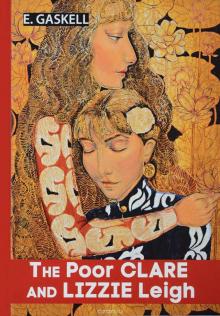 Lizzie Leigh
Lizzie Leigh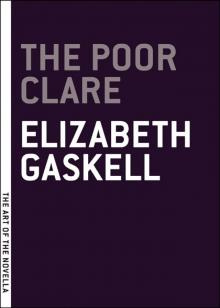 The Poor Clare
The Poor Clare Lois the Witch
Lois the Witch North and South
North and South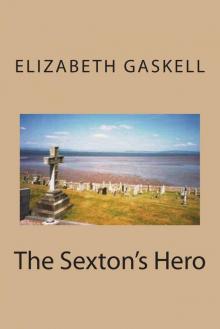 Sexton's Hero
Sexton's Hero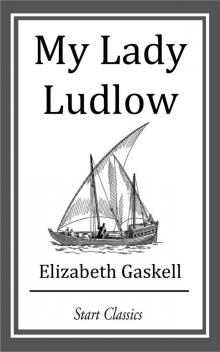 My Lady Ludlow
My Lady Ludlow Uncle Peter
Uncle Peter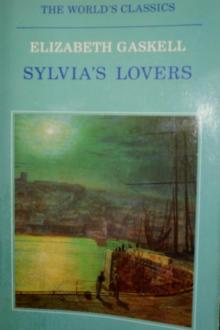 Sylvia's Lovers Elizabeth Cleghorn Gaskell
Sylvia's Lovers Elizabeth Cleghorn Gaskell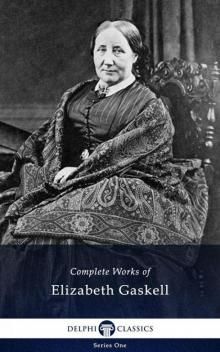 Delphi Complete Works of Elizabeth Gaskell
Delphi Complete Works of Elizabeth Gaskell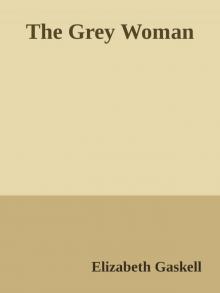 The Grey Woman
The Grey Woman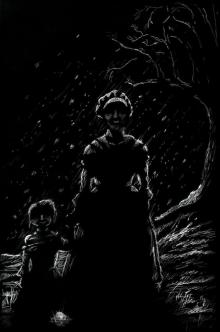 The Old Nurse's Story and Other Tales
The Old Nurse's Story and Other Tales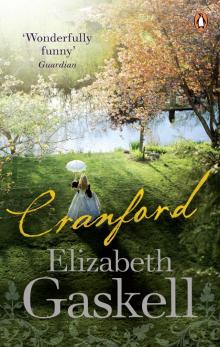 Cranford
Cranford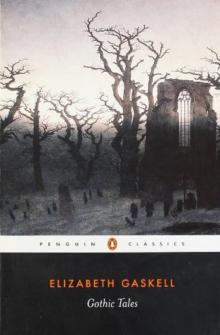 Gothic Tales
Gothic Tales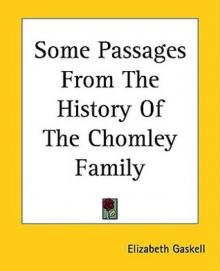 Some Passages From the History of the Chomley Family
Some Passages From the History of the Chomley Family An Accursed Race
An Accursed Race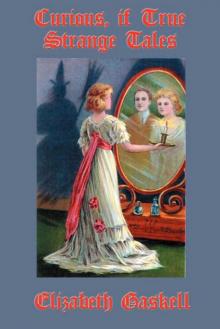 Curious, if True: Strange Tales Elizabeth Cleghorn Gaskell
Curious, if True: Strange Tales Elizabeth Cleghorn Gaskell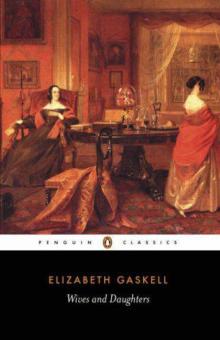 Wives and Daughters
Wives and Daughters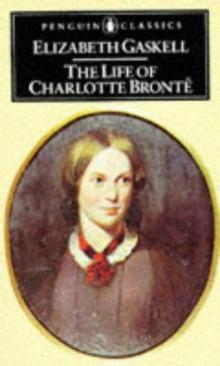 The life of Charlotte Brontë
The life of Charlotte Brontë